
As was to be expected, today’s edition of the Chinese Communist Party’s official People’s Daily newspaper went all black in a show of mourning for the death of former general secretary Jiang Zemin, who passed away yesterday afternoon in Shanghai at the age of 96.
The front page of the newspaper carries the same official Xinhua News Agency release that made the rounds late yesterday — a letter of notice to the entire country about the passing of a comrade “who had the utmost respect of our Party, our military, and the various peoples of our nation.”
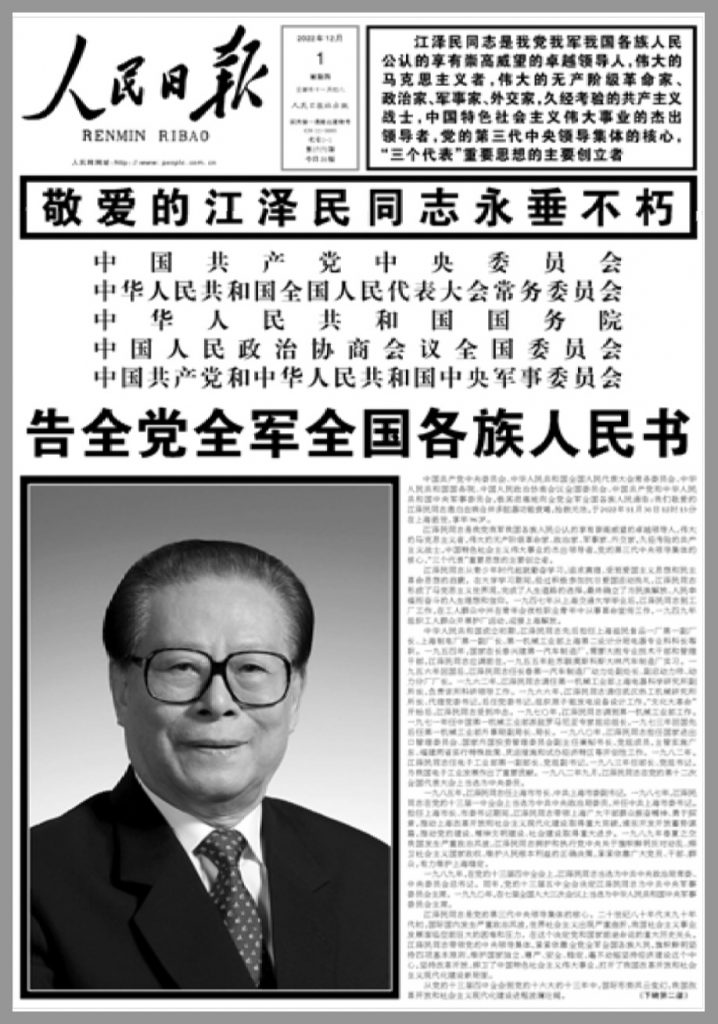
Given the high level of sensitivity surrounding the death of a senior CCP leader, we can expect the media inside China to keep strictly to the official line, and so it is little surprise today to see that papers and websites across the country continue to run the official Xinhua releases and little else.
The letter of notice continues to top the website of the People’s Daily today just as it was posted yesterday. The image slider at the top of the site, which generally wheels will brightly colored photographs, is frozen with the notice of Jiang’s death, the dark characters identical to what can be seen just below the masthead in today’s print edition.
Across the country, the treatment of the story has been virtually identical. Here is a glimpse at a few other papers, including CCP mouthpieces (across the top) and their corresponding commercial spin-offs.
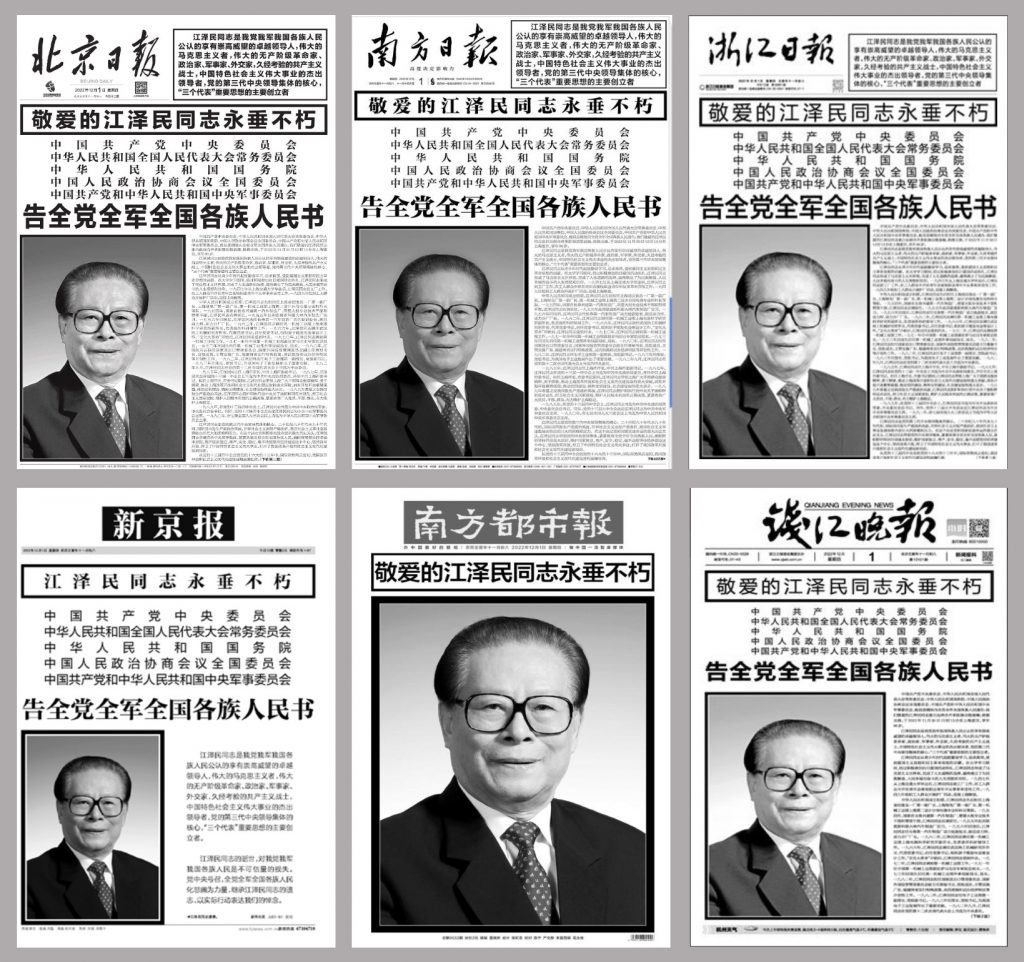
In the selection above, the only paper departing ever so slightly in its layout choice is Guangzhou’s Southern Metropolis Daily (center bottom), a commercial spin-off, or zibao (子报), of Guangdong province’s official Nanfang Daily (center top). Rather than run the text of the letter of notice along with the list of authorities releasing it, the newspaper fills nearly the entire page with a large image of Jiang.
But the level of uniformity on the front pages today, which is mirrored also on news websites across the country, such as the provincial news portal of Fujian province shown below, is a clear testament to the sensitivity with which the CCP treats the news of the passing of any senior political figure.
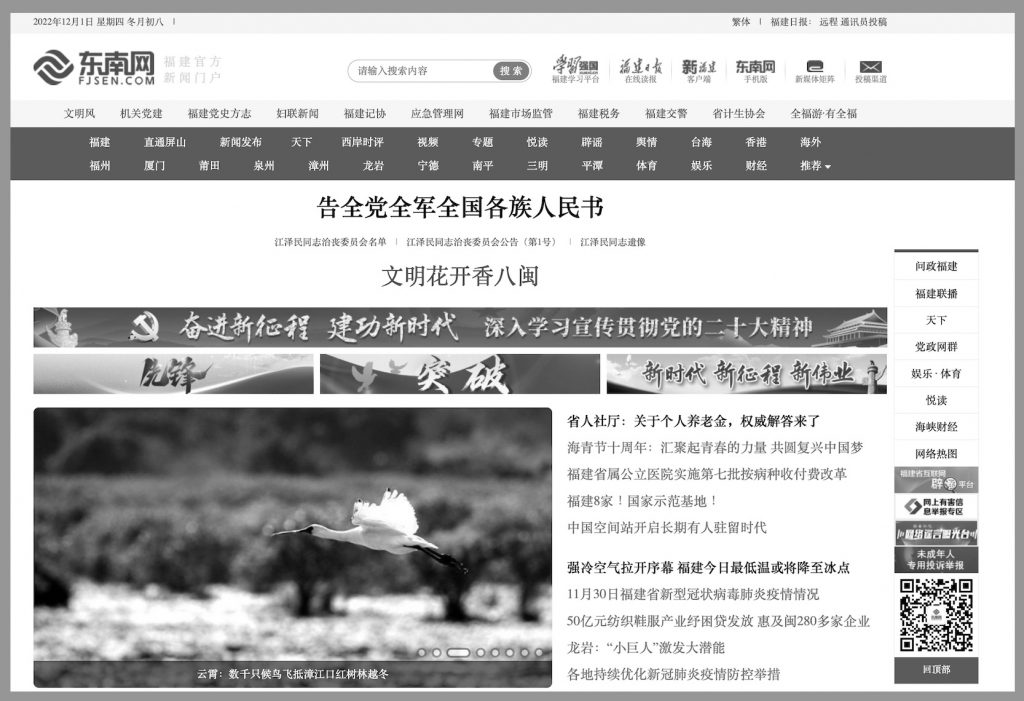
Reactions to death can of course be deeply personal, and they are matters of real grief for family members and friends. But the death of any “comrade” in China is a deeply political matter too, over which the Chinese Communist Party must have the final word. The meaning of an official’s death, like the meaning of history, must be arbitrated through official discourse.
When we look at the front page of the People’s Daily today, and at the front pages of local Party-run newspapers across the country — identical save for the differing nameplates only — we can see clearly the act of discursive framing, meant to define the bounds of Jiang Zemin’s influence and remembrance.
The text of the letter of notice is itself of interest, naturally. Many have noted the reference to the “political turmoil” of 1989, the democratic movement that culminated in the bloody and brutal crackdown in Beijing, which of course is never mentioned, the letter simply stating that “Comrade Jiang Zemin supported and implemented the correct decision of the CCP Central Committee to oppose unrest, defend socialist state power and safeguard the fundamental interests of the people, and relied closely on the Party members, cadres and the masses to vigorously maintain stability in Shanghai.”
But the primary act of framing I’m referring to can be seen clearly in the identical layouts themselves. The CCP leadership has already highlighted for us what it regards as the most crucial paragraph of the letter of notice, paragraph two, which is pulled out and emphasized by inclusion in the space directly to the right of the People’s Daily masthead, known in Chinese as the “newspaper eye,” or baoyan (报眼).
Here is that paragraph, which we emphasized yesterday at CMP in our brief summary of online media coverage.
Comrade Jiang Zemin was an outstanding leader who had the utmost respect of our Party, our military, and the various peoples of our nation; a great Marxist, a great proletarian revolutionary, politician, military expert, and diplomat; a tried and tested communist fighter, an outstanding leader of the great cause of socialism with Chinese characteristics; the core of the third generation of the Party’s collective leadership; and the main founder of the important thought of the ‘Three Represents.’
Commenting on the release yesterday, political scientist Victor Shih from UCSD noted that Jiang’s official obituary is “a bit effusive.” On one level, this is certainly true. Seen through the eyeglass of living language, this passage is embarrassingly lavish, enough to make any world leader blush.
In fact, the passage is not so much exuberant as formulaic. And as any close observer of Chinese politics knows, even deadened formulas matter in the living world of Party power. Often, they matter a great deal.
So how should we unpack the passage found in today’s baoyan?
Outstanding Leaders
Let’s begin with the first honor pinned to Jiang Zemin’s legacy: “an outstanding leader who had the utmost respect of our Party, our military, and the various peoples of our nation” (我党我军我国各族人民公认的享有崇高威望的卓越领导人). When we search for this phrase in the archives of the People’s Daily, we naturally turn up two separate articles printed across the first three pages of today’s edition. But beyond these, we must go back to the period between February 1997 and 2014, during which another leader was consistently honored in the newspaper as “an outstanding leader who had the utmost respect of our Party, our military, and the various peoples of our nation.”
That leader, as most will probably guess, was Deng Xiaoping. The “outstanding leader” badge of honor in reference to Deng first appears on February 20, 1997, the day after his death in Beijing at the age of 92.
A look at the front page of the People’s Daily on February 20, 1997, demonstrates again just how ritualistic the process of passing is for a senior CCP leader. The likeness to today’s front page is astonishing.
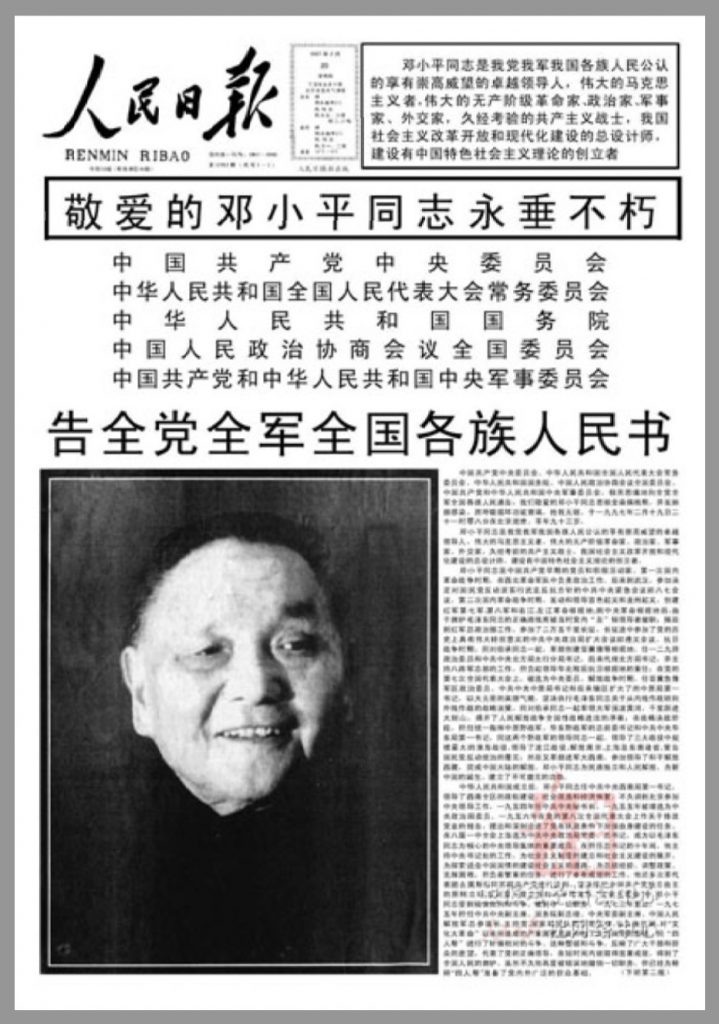
For comparison, let’s put the two front pages alongside one another.
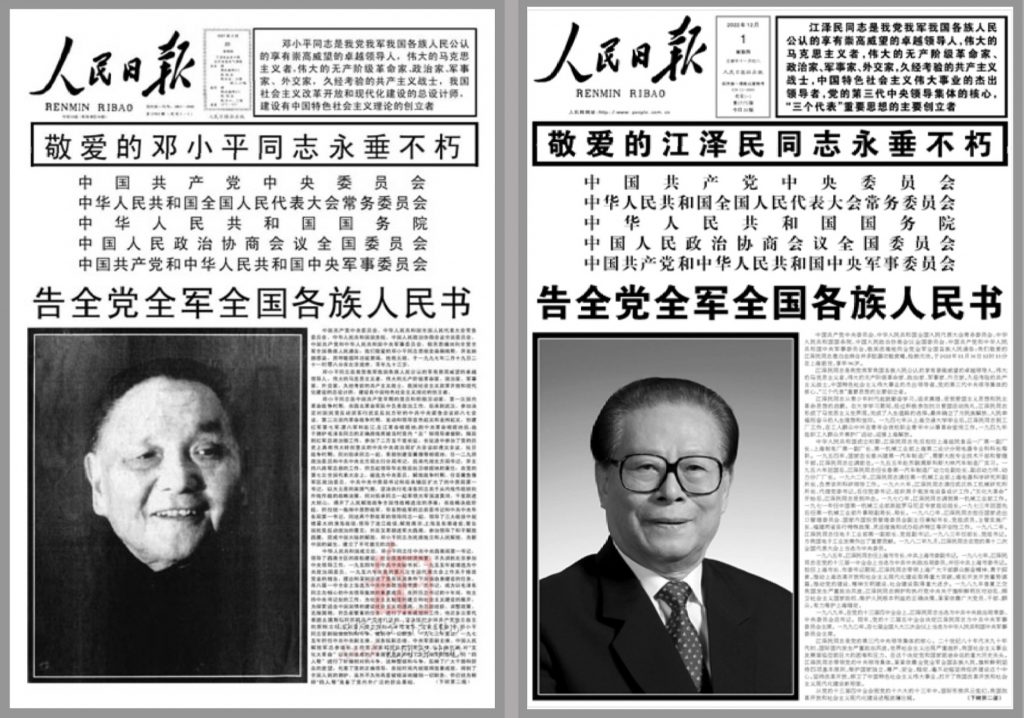
This particular “outstanding leader” formulation was never used before Deng Xiaoping. And until yesterday, it was never used after. On this particular designation, then, we can see that Jiang has been placed in the same company as Deng, an outstanding leader succeeding an outstanding leader. Will the formulation be used for Jiang’s successors? This of course is a question that will have to wait. But we should see the phrase used consistently in the coming months and years as Jiang Zemin is mentioned in the official CCP media.
But look more closely at the “newspaper eyes” of each of the above front pages. They too are virtually identical. In the case of Deng, as in the case of Jiang, it is the second paragraph of the identically titled letter of notice that conveys the most essential material about how the leader is to be framed.
Only the latter portions of the baoyan content differ, adjusted to reflect the unique contributions of each. In Deng’s case, he is the “general architect” of opening and reform and the building of modernization, and the “creator” of the theory of socialism with Chinese characteristics. In Jiang’s case, he is the “outstanding leader of the great project of socialism with Chinese characteristics,” the “core” of the third generation of leadership, and the “principal creator” of the “important thought” of the Three Represents.
Great Marxists
When we turn to the next formulation in the key passage about Jiang in the “newspaper eye” today, “a great Marxist” (伟大的马克思主义者), we find a somewhat richer history — but one nevertheless quite exclusive. The label has been used regularly in the official media for important historical figures in the CCP, the likes of Li Dazhao (李大釗), one of the Party’s co-founders in the 1920s, and Qu Qiubai (瞿秋白), who was coaxed back to China from Russia in 1923 to join the communist cause.
When Xi Jinping delivered a speech in November 2018 to commemorate the 120th anniversary of the birth of former chairman Liu Shaoqi (刘少奇), who was persecuted and jailed during the Cultural Revolution, Xi referred to Liu as “a great Marxist.” Zhou Enlai (周恩来) too has been afforded the label from time to time in Party writings.
The original great Marxists, appearing earliest with the badge of honor in the People’s Daily, were of course Soviet leaders Vladimir Lenin and Josef Stalin. The phrase was used regularly for Stalin in particular in China from 1949 through to 1957, after which point most references to “great Marxist” in CCP discourse were direct references to Mao Zedong (毛泽东), portrayed in official Party histories as having carried on the work of Stalin, and the path in China begun by Li Dazhao and other CCP founders.
The reference to Jiang Zemin as a “great Marxist” situates him squarely within a lineage of power and theoretical prowess, the heartstring of the CCP, that can be traced back to Stalin, on to Lenin, and ultimately back to the progenitor, Marx himself.
Great Proletarians
The third honorific in today’s baoyan for Jiang Zemin — and the last I’ll trace — is the ponderous phrase “a great proletarian revolutionary, politician, military expert, and diplomat” (伟大的无产阶级革命家、政治家、军事家、外交家).
Once again, this phrase was born on February 20, 1997, the day the news of the death of Deng Xiaoping was published on the front page of the People’s Daily. Before yesterday, the phrase had been used only in reference to Deng Xiaoping and one other senior leader: Zhou Enlai.
Interestingly, in a reminder of just how much power current leaders have over the framing and remembrance of their predecessors, the man to designate Zhou Enlai as a “great proletarian revolutionary” was none other than Jiang Zemin. This happened on February 23, 1998, as Jiang addressed an event to commemorate the 100th anniversary of Zhou’s birth.
As though presaging his own valorization in death by senior leaders under the thumb of Xi Jinping, Jiang said immediately after his salutation to comrades and friends that day: “Comrade Zhou Enlai was a great Marxist, a chief leader of the Party and the country, one of the creators of the People’s Liberation Army, and a great proletarian revolutionary, politician, military expert, and diplomat.”




















